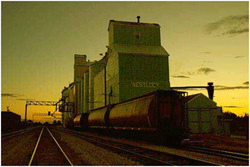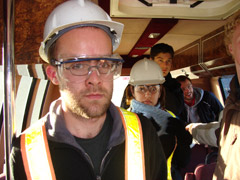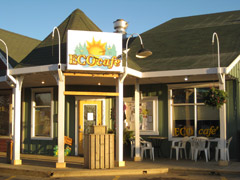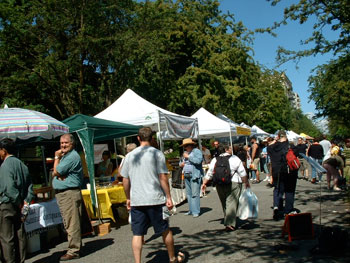
SERC 2 Research
BALTA’s Social Economy Research Cluster (SERC) 2 focuses on research regarding the role of the social economy in rural revitalization and development. Research projects began in 2007 and will continue through to 2011. To date, SERC 2 has prioritized research on the following themes:
- Local and sustainable food systems , including particular attention to the role of farmers’ markets
- Sustainability and greening of the social economy
- The potential role of social economy organizations in renewable energy, particularly wind generation
Reciprocity is Green: Sustainable Development and the Social Economy – Power point presentation to the 2009 BALTA symposium by SERC 2 members, Mark Roseland and Sean Markey.
The broad context and mandate for SERC 2's research program is derived from the BALTA proposal to the Social Sciences and Humanities Research Council of Canada (SSHRC) to establish a five year research network and program.
SERC 2's annual research program, including a summary of specific projects, is laid out in annual workplans:
No general workplan was produced for 2009-2010, though several individual new projects (see below) were launched during that period.
To date, SERC 2 has implemented (completed or nearing completion) nine research projects. SERC 2 members have also been involved in several cross-cutting research projects in collaboration with other SERCs. Some further case studies are planned in 2010.
Project B1 – Understanding the Role of the Social Economy in Advancing Rural Revitalization and Development
Project Leads: Mary Beckie, University of Alberta; Sean Markey, Simon Fraser University
Student Research Assistants: Wendy Aupers, Athabasca University; Billy Collins, Simon Fraser University
This project focused on the role that social enterprises in specific resource sectors play in sustaining and revitalizing rural communities. It was intended as a broad scoping study to gather an overview of sectors in Alberta and British Columbia, Canada, relevant to the research focus of SERC 2: non-timber forest products; local and organic food systems; eco-tourism; fisheries; and renewable energy. The project was terminated early in favour of more focused research approaches, but several draft/preliminary reports were produced, several of which are included below. These reports were never finalized and are not intended for publication.
Draft – Annotated SERC 2 Bibliography
Project B2 – Sustainability and the Social Economy
Project Lead: Mike Gismondi, Athabasca University Student
Research Assistant: Lena Soots, Simon Fraser University
Current global issues such as climate change and peak oil have brought attention to the severity and complexity of our eco-social crisis and called for local action and community-based solutions. This project explored how the social economy can help to address local issues in this context and contribute to the transition to a more sustainable society. The project compared the historical and ideological foundations of the social economy with those of the sustainability movement. It proposes that effective community responses to current socio-ecological crises would benefit from some bridging and building between the two schools of thought and fields of practice. The researchers highlight how practitioners in both the social economy and sustainability fields can understand the eco-social crisis and compare how each organizes its alternatives around notions of trust, mutuality and sensitivity to community locale.
Interview with Mark Roseland, SERC 2 Co-Chair, on "Making sustainable communities", Aurora Online Journal, 2007.
Project B3 – Sustainability, Heritage Conservation and Sheltering the Social Economy
Project Lead: Mike Gismondi, Athabasca University Student
Research Assistant: Erin Swift, University of Calgary
Many social economy organizations operate out of, or own and manage, heritage buildings in urban and rural places. These heritage buildings provide a variety of functions from the provision of affordable housing and safe-houses to artist co-operatives and studio space for cultural groups. Others house social and human services organizations, treatment centres, retail co-operatives and office space for the non-profit sector. This project had the following objectives: To critically assess the relationship between heritage conservation (ideational and built) and social economy organizations' needs for shelter; and to critically asses the concept of sustainability as it relates to heritage buildings, including the concepts of a 'built heritage' of social democracy and an architecture of the social commons.
Interview with Martin Garber-Conrad, CEO of the Edmonton Community Foundation, on "Fosering the social economy in Alberta", Aurora Online Journal, 2008.
Project B4 – Social Economy Case Studies in Rural Alberta
Project Lead: Karsten Mundel, Augustana Campus, University of Alberta
Student Research Assistants: Students in the Puebla-Alberta Community Service
Exchange: Nathaniel Chellick (UofA), Elizabeth Chicuale Guzman (UDLA), Chelsea Halvorson (UofA), Daniel Francois Hugo (UofA), Devin Keay (UofA), Mark Lyseng (UofA), Ryan Mason (UofA), Mark Prescott (UofA), Odessa Sheraniuk (UofA)
The Puebla-Alberta Community Service Exchange (PACSE) involves students from Augustana Campus, University of Alberta, and Universidad de las Americas in Puebla, Mexico, in community based learning and research in rural Mexico and Alberta. This project involved the students in case studies research focusing on social economy related organizations in rural Alberta. Case studies will be completed in written and podcast formats.
PACSE students |
ECO-Café in Pigeon Lake, Alberta |
Podcast of case study of the Voice of Community and Land Society (VOCAL) by Ryan Mason and Devin Keay

Projects B5 & B7 – Farmers' Markets as Social Economy Drivers of Local Food Systems (Phases I and II)
Project Leads: Mary Beckie, University of Alberta; Hannah Wittman, Simon Fraser University; Paul Cabaj, Canadian Centre for Community Renewal; Herb Barbolet, Simon Fraser University; Will Low, Royal Roads University
Student Research Assistants: Chris Hergesheimer, Simon Fraser University; Emily Huddart Kennedy, University of Alberta; Melisa Zapisocky, University of Alberta
There is growing interest in the re-localization of food systems. Farmers' markets are important and increasingly prevalent sites of economic and social exchange in the evolution of local food systems. Little is understood, however, about the role of farmers' markets in fostering increased local production and consumption, or the broader impacts of these social economy enterprises on the communities (both urban and rural) and regions with which they are associated. This research over two phases has examined and compared the current and potential role of farmers' markets in British Columbia and Alberta, Canada, as social economy drivers for local food systems.
Power point presentation on Project B5 for November 13-14, 2008, BALTA Symposium
Power point presentation on Projects B5 & B7 for November 24-25, 2009, BALTA Symposium
Farmers' market in Vancouver |
Project B6 – Prospects for Socializing the Green Economy: The Case of Renewable Energy
Project Leads: Noel Keough, University of Calgary; Paul Cabaj, Canadian Centre for Community Renewal
Student Research Assistant: Julie MacArthur, Simon Fraser University
This project explored the prospects for social economy and co-operative involvement in wind energy production in Alberta, Canada. It examined the context for wind energy production and involvement by social economy organizations in wind generation, then examined several best practice cases in Canada and internationally, then facilitated exploration of a strategy for developing the sector.
Report – Status of Social Economy Provision of Wind Electric Energy in Alberta
Report – Best Practices in Social Economy and Community Wind
Report - Alberta Social Economy Wind Projects Next Steps Strategy
Project B8 – Social Economizing Sustainability
Project Leads: Sean Markey, Simon Fraser University; Mike Lewis, Canadian Centre for Community Renewal; Mary Beckie, University of Alberta Post-Doctoral Researcher: Sean Connelly, Simon Fraser University
This project supports a BALTA post-doctoral researcher position. The focus of the position has been partially on facilitating analysis and synthesis of cross-BALTA research linked to the research interests of BALTA's Social Economy Research Cluster (SERC) 2 on sustainability and rural revitalization. More specifically, the research has focused on research related to local food.
Report on Local Food Initiatives for Social and Environmental Change in Vancouver and Edmonton
Report on Seikatsu Consumer Co-operative
Project D1 – Examining the Connection Between Sustainable Rural Development and the Social Economy in British Columbia and Alberta
Project Lead: Sean Markey, Simon Fraser University
Student Research Assistant: Andre Vallillee, University of British Columbia
One of the first steps in any research process is to undertake a thorough review of the existing literature in a particular area in order to understand the field of knowledge that is being drawn from and built upon. It is also important from an academic point of view to "map" the existing literature in order to situate the contributions of BALTA within the broader social economy field. This is one of three parallel literature reviews conducted in early 2007 for each of the 3 BALTA Social Economy Research Clusters (SERCs).
Westlock Grain Terminals: A Case Study
 Westlock Grain Terminals, a new generation co-operative in Westlock, Alberta
Westlock Grain Terminals, a new generation co-operative in Westlock, Alberta
Case study prepared by: Paul Cabaj, Canadian Centre for Community Renewal; Mike Gismondi, Athabasca University; Richard Stringham, Alberta Community and Co-operative Association; Darren Wood, Co-operative Intern, Keep Edmonton Original
This BALTA case study looks at Westlock Grain terminals, an inspiring example of how local farmers and other community members in Westlock, Alberta, came together to save their local grain terminal and form an innovative new co-operative. Westlock's subsequent success provides one example of potential strategies to confront the crisis facing farmers and farm based communities in Alberta.







